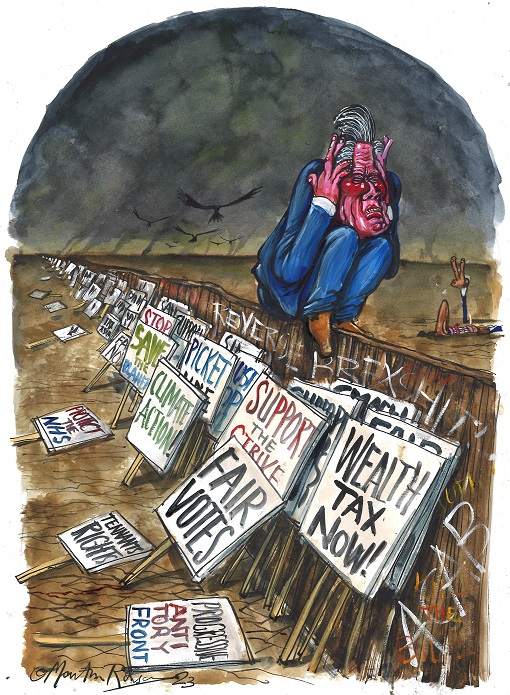
Labour is running well ahead of the Tories in opinion polls. Labour won the Selby and Ainstey byelection with a 22% swing. This is an indication that Starmer is wooing “red wall” voters. Current campaign strategy seems to be: say as little as possible and let the Government’s failure on the cost of living crisis and other measures lose them popularity.
Is this enough to win an electoral majority? Many believe not.
It is worth taking a leaf out the Harold Wilson playbook in 1964 with Labour’s message of modernisation combined with radical change following 13 years of Tory rule. Labour needs a strong message. It’s not clear what it is.
The economy continues to flounder on the brink of recession with inflation still running at over 7 per cent and food price rises at over 12 percent. As Geoff Tily says this is a deliberate policy of the chancellor to inflict real pain on millions of people in and out of work. However, as Tily and Ignacia Pinto demonstrate this pain is unequal and is not touching the energy giants, the big banks and corporations who are making windfall profits. It is working people, the unemployed and particularly women who are carrying the burden of rising rents and mortgages, doubling energy prices, reduced public services resulting from government policy.
In these circumstances workers and their families need a Labour Party that is willing to stand up for their rights and living standards. Instead, Labour is resisting the ending of the two child benefit cap pushing thousands of children into poverty. Karen Constantine calls for a rethink and a reality check on Labour values.
At the Labour Party policy forum conference in July members had already been told that the £28bn green growth plan would be put on hold for the early years of a Labour government. Further Labour’s flagship New Deal for Working People, involving a range of rights at work and repeal of much anti-trade union law looks to have also been watered down. Robbie Scott of Labour Unions outlines the essential elements and thinking behind the plan and why it should be central to Labour’s strategy.
Public services should be another vital area for refuelling and strengthening in a Labour manifesto. Stephanie Clark and Carol Saunders show how the NHS is on the critical list following years of underfunding and privatisation. Labour needs to step up to the plate putting the NHS centre stage of its commitments in this its 75th year on from Bevan’s launch of the service free for all at the point of delivery. That means also supporting its staff in pursuit of pay increases to retain and recruit more doctors and nurses.
Tax policy should be another area where Labour could highlight Tory weakness. A recent report from the Intergenerational Foundation shows that an income tax payer earning £35k pays almost double the average tax of someone with the same income from renting property. Capital Gains Tax on property and shares is far below income tax. It’s not enough to have a windfall tax and non-dom tax. The richest members of society should be paying a higher rate of tax.
Scotland will be another key battleground in the next election. A key test will be the forthcoming byelection in South Ayrshire. Gerry Hassan reports Labour is trapped in an antiquated culture and politics in Scotland. Anas Sanwar and Starmer should take a leaf from Mark Drakeford’s Welsh Labour in adopting a more imaginative and pro-national position.
Sunak and his government are on the ropes lamely repeating their tired slogans about stopping small boats and halving inflation. Bridget Chapman and Caitlin Barr expose the fallacies and racism of the first empty slogan while the evidence of failure on prices is evident in people’s pockets.
Artificial Intelligence is moving from the realm of science fiction to reality. Pete Chalk and Robbie Scott explore the dangers and opportunities in education and work more generally.
Internationally the war in Ukraine continues. Pete Duncan examines the fate of the Wagner mercenary army following the likely assassination of its leader while calling for deepening support for embattled Ukrainians. The extreme right regime in Israel is creating turmoil in its attempts to sideline the judiciary and extend illegal settlements reports Mike Heiser. In Spain the Socialist led-coalition narrowly held off the right and weakened the fascist right in the recent general election reports Brian O’Leary. However, the near stalemate means another election is likely.
Because of the importance of the global context for the Labour movement Chartist is producing another supplement covering the big themes that will dominate a future Labour government’s approach. This means the European Union and the consequences of Brexit; trade relations and agreements; climate change and the environment; immigration and the war in Ukraine; the wider conflicts between the West and China and the rise of right-wing populism.
Dave Lister reminds us of the flawed politics of Leninism, especially in the realm of civil society while Mary Southcott applauds the idea of citizen’s assemblies allied to proportional representation as a way to turbocharge our limited democracy. Starmer’s Labour has been relatively silent on international questions and democratic reform. However, this year’s Labour conference and party leadership will have to adopt clearer positions on democratic change and burnish its internationalist credentials alongside a radical economic alternative if it is to become a winner in next year’s general election. The time for coming off the fence on critical questions from Brexit to bread and butter issues, from worker’s rights to wars in Europe and Africa, from greening the economy to growing public services is upon us. Will Starmer grasp the challenge?

I can think of few things more likely to produce a massive wish-list with no priorities or practical solutions than “citizen’s assemblies allied to proportional representation as a way to turbocharge our limited democracy”. Sounds like student union politics to me.